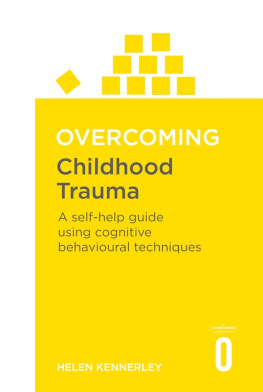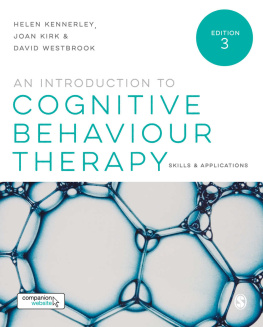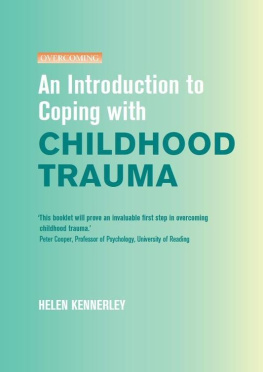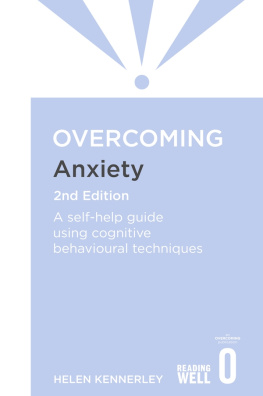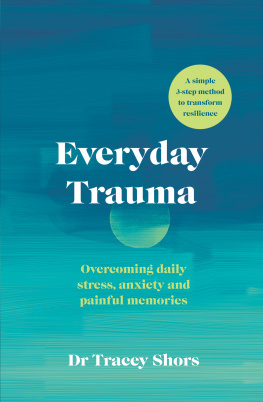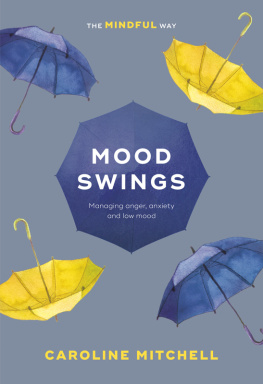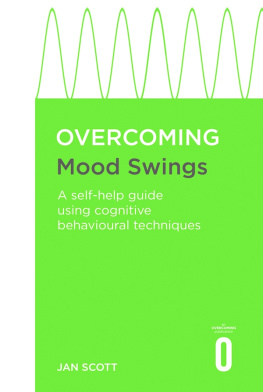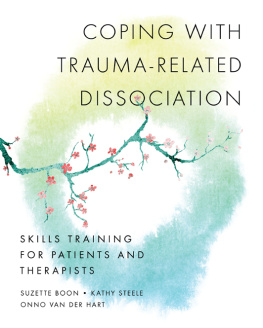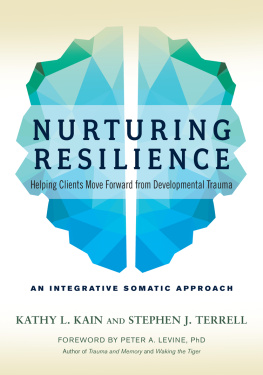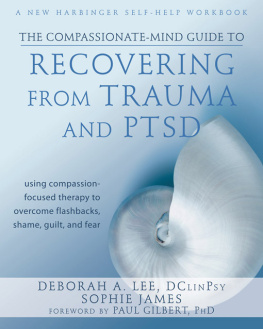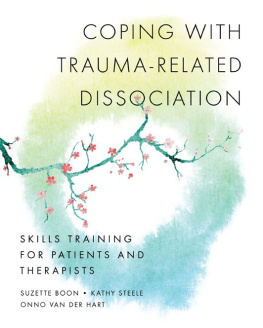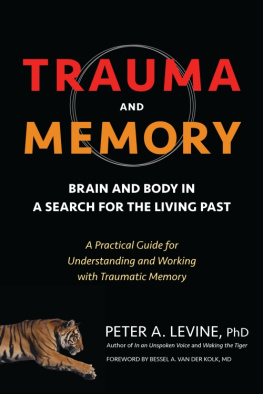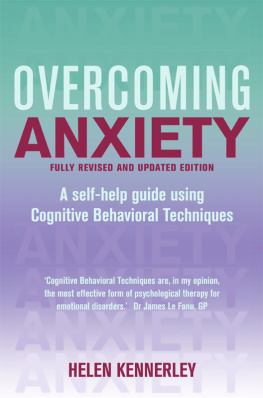Helen Kennerley - Overcoming Childhood Trauma
Here you can read online Helen Kennerley - Overcoming Childhood Trauma full text of the book (entire story) in english for free. Download pdf and epub, get meaning, cover and reviews about this ebook. year: 2012, publisher: Little, Brown Book Group, genre: Religion. Description of the work, (preface) as well as reviews are available. Best literature library LitArk.com created for fans of good reading and offers a wide selection of genres:
Romance novel
Science fiction
Adventure
Detective
Science
History
Home and family
Prose
Art
Politics
Computer
Non-fiction
Religion
Business
Children
Humor
Choose a favorite category and find really read worthwhile books. Enjoy immersion in the world of imagination, feel the emotions of the characters or learn something new for yourself, make an fascinating discovery.
- Book:Overcoming Childhood Trauma
- Author:
- Publisher:Little, Brown Book Group
- Genre:
- Year:2012
- Rating:4 / 5
- Favourites:Add to favourites
- Your mark:
- 80
- 1
- 2
- 3
- 4
- 5
Overcoming Childhood Trauma: summary, description and annotation
We offer to read an annotation, description, summary or preface (depends on what the author of the book "Overcoming Childhood Trauma" wrote himself). If you haven't found the necessary information about the book — write in the comments, we will try to find it.
Overcoming Childhood Trauma — read online for free the complete book (whole text) full work
Below is the text of the book, divided by pages. System saving the place of the last page read, allows you to conveniently read the book "Overcoming Childhood Trauma" online for free, without having to search again every time where you left off. Put a bookmark, and you can go to the page where you finished reading at any time.
Font size:
Interval:
Bookmark:
Dr Kennerley is the author of Overcoming Anxiety, the Overcoming Anxiety Self-Help Course and Overcoming Childhood Trauma. She qualified in Clinical Psychology at Oxford, where she also trained to become a cognitive therapist. She is one of the founder members of the Oxford Cognitive Therapy Centre (OCTC). Currently, she works as a consultant within OCTC, where she is the lead clinician of a specialist clinic in cognitive therapy. Helen has presented many workshops in her area of expertise both nationally and internationally. In 2002 she was shortlisted by the British Association for Behaviour and Cognitive Psychotherapies for the award for most influential female cognitive therapist in Britain.
The aim of the Overcoming series is to enable people with a range of common problems and disorders to take control of their own recovery program. Each title, with its specially tailored program, is devised by a practicing clinician using the latest techniques of cognitive behavioral therapy techniques which have been shown to be highly effective in changing the way patients think about themselves and their problems. The series was initiated in 1993 by Peter Cooper, Professor of Psychology at Reading University and Research Fellow at the University of Cambridge in the UK whose original volume on overcoming bulimia nervosa and binge-eating continues to help many people in the USA, the UK and Europe.
Titles in the series include:
OVERCOMING ANGER AND IRRITABILITY
OVERCOMING ANOREXIA NERVOSA
OVERCOMING ANXIETY
OVERCOMING BODY IMAGE PROBLEMS
OVERCOMING BULIMIA NERVOSA AND BINGE-EATING
OVERCOMING CHRONIC FATIGUE
OVERCOMING CHRONIC PAIN
OVERCOMING COMPULSIVE GAMBLING
OVERCOMING DEPERSONALIZATION AND FEELINGS OF UNREALITY
OVERCOMING DEPRESSION
OVERCOMING GRIEF
OVERCOMING INSOMNIA AND SLEEP PROBLEMS
OVERCOMING LOW SELF-ESTEEM
OVERCOMING MOOD SWINGS
OVERCOMING OBSESSIVE COMPULSIVE DISORDER
OVERCOMING PANIC
OVERCOMING PARANOID AND SUSPICIOUS THOUGHTS
OVERCOMING RELATIONSHIP PROBLEMS
OVERCOMING SEXUAL PROBLEMS
OVERCOMING SOCIAL ANXIETY AND SHYNESS
OVERCOMING TRAUMATIC STRESS
OVERCOMING WEIGHT PROBLEMS
OVERCOMING WORRY
OVERCOMING YOUR CHILDS FEARS AND WORRIES
OVERCOMING YOUR CHILDS SHYNESS AND SOCIAL ANXIETY
OVERCOMING YOUR SMOKING HABIT
All titles in the series are available by mail order.
Please see the order form at the back of this book.
www.overcoming.co.uk
CHILDHOOD
TRAUMA
A self-help guide using
Cognitive Behavioral Techniques
HELEN KENNERLEY
Robinson
LONDON
COPYRIGHT
Published by Robinson
ISBN: 978-1-47210-572-1
Copyright Helen Kennerley 2009
The moral right of the author has been asserted.
All rights reserved. No part of this publication may be reproduced, stored in a retrieval system, or transmitted, in any form or by any means, without the prior permission in writing of the publisher.
The publisher is not responsible for websites (or their content) that are not owned by the publisher.
Robinson
Little, Brown Book Group
Carmelite House
50 Victoria Embankment
London, EC4Y 0DZ
www.littlebrown.co.uk
www.hachette.co.uk
This book is not intended as a substitute for medical advice or treatment. Any person with a condition requiring medical attention should consult a qualified medical practitioner or suitable therapist.
The recovery program outlined in this book is based on the ideas of Aaron T. Beck but, over the last ten years or so, the comments of colleagues and clients have helped to reshape the program so that it better meets the needs of survivors of childhood trauma. I am grateful to each for their feedback.
I feel that the comments from clients have been most valuable. Without them, the program might well have been no more than a theory-based protocol, rather than an approach that is really meaningful for the reader. Professionally, my colleagues Rachel Norris, Gillian Butler, Linette Whitehead and Joan Kirk have also contributed to the fine tuning of the ideas in this book, and Claire Middle helped in proof-reading.
At home, Udo Kischka generously read through drafts of the book and, I think, helped make the text much more user-friendly.
Many case examples are used in this book in order to make the text more accessible. Although all of the descriptions are based on my clinical experiences, none of them reflects an actual person, with the exception of Lucy. Rather, descriptions are compilations of real experiences which are used to illustrate a point.
Over the past two or three decades, there has been something of a revolution in the field of psychological treatment. Freud and his followers had a major impact on the way in which psychological therapy was conceptualized, and psychoanalysis and psychodynamic psychotherapy dominated the field for the first half of this century. So, longterm treatments were offered which were designed to uncover the childhood roots of personal problems offered, that is, to those who could afford it. There was some attempt by a few health service practitioners with a public conscience to modify this form of treatment (by, for example, offering short-term treatment or group therapy), but the demand for help was so great that this had little impact. Also, whilst numerous case histories can be found of people who are convinced that psychotherapy did help them, practitioners of this form of therapy showed remarkably little interest in demonstrating that what they were offering their patients was, in fact, helpful.
As a reaction to the exclusivity of psychodynamic therapies and the slender evidence for their usefulness, in the 1950s and 1960s a set of techniques was developed, broadly collectively termed behavior therapy. These techniques shared two basic features. First, they aimed to remove symptoms (such as anxiety) by dealing with those symptoms themselves, rather than their deep-seated underlying historical causes. Second, they were techniques, loosely related to what laboratory psychologists were finding out about the mechanisms of learning, which were formulated in testable terms. Indeed, practitioners of behavior therapy were committed to using techniques of proven value or, at worst, of a form which could potentially be put to the test. The area where these techniques proved of most value was in the treatment of anxiety disorders, especially specific phobias (such as fear of animals or of heights) and agoraphobia, both notoriously difficult to treat using conventional psychotherapies.
After an initial flush of enthusiasm, discontent with behavior therapy grew. There were a number of reasons for this, an important one of which was the fact that behavior therapy did not deal with the internal thoughts which were so obviously central to the distress that patients were experiencing. In this context, the fact that behavior therapy proved so inadequate when it came to the treatment of depression highlighted the need for major revision. In the late 1960s and early 1970s a treatment was developed specifically for depression called cognitive therapy. The pioneer in this enterprise was an American psychiatrist, Professor Aaron T. Beck, who developed a theory of depression which emphasized the importance of peoples depressed styles of thinking. He also specified a new form of therapy. It would not be an exaggeration to say that Becks work has changed the nature of psychotherapy, not just for depressions but for a range of psychological problems.
In recent years the cognitive techniques introduced by Beck have been merged with the techniques developed earlier by the behavior therapists to produce a body of theory and practice which has come to be known as cognitive behavior therapy. There are two reasons why this form of treatment has come to be so important within the field of psychotherapy. First, cognitive therapy for depression, as originally described by Beck and developed by his successors, has been subjected to the strictest scientific testing; and it has been found to be a highly successful treatment for a significant proportion of cases of depression. Not only has it proved to be as effective as the best alternative treatments (except in the most severe cases, where medication is required), but some studies suggest that people treated successfully with cognitive behavior therapy are less likely to experience a later recurrence of their depression than people treated successfully with other forms of therapy (such as antidepressant medication). Second, it has become clear that specific patterns of thinking are associated with a range of psychological problems and that treatments which deal with these styles of thinking are highly effective. So, specific cognitive behavioral treatments have been developed for anxiety disorders, like panic disorder, generalized anxiety disorder, specific phobias and social phobia, obsessive compulsive disorders, and hypochondriasis (health anxiety), as well as for other conditions such as compulsive gambling, alcohol and drug addiction, and eating disorders like bulimia nervosa and binge-eating disorder. Indeed, cognitive behavorial techniques have a wide application beyond the narrow categories of psychological disorders: they have been applied effectively, for example, to helping people with low self-esteem and those with marital difficulties.
Next pageFont size:
Interval:
Bookmark:
Similar books «Overcoming Childhood Trauma»
Look at similar books to Overcoming Childhood Trauma. We have selected literature similar in name and meaning in the hope of providing readers with more options to find new, interesting, not yet read works.
Discussion, reviews of the book Overcoming Childhood Trauma and just readers' own opinions. Leave your comments, write what you think about the work, its meaning or the main characters. Specify what exactly you liked and what you didn't like, and why you think so.

